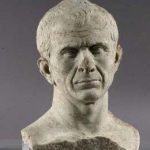A special role in inciting resistance against the Romans was played by the extraordinary authority of the supernatural “intellectual elite” of the Celts – a network of centres bringing together the Celtic priesthood, a huge confraternity of druids, extending on both sides of the English Channel and maintaining close communication with each other.
It was the “intelligentsia” of the Celts, possessing extremely rich knowledge and skills, preserving their collective memory, their traditions, and a sense of ethnic, cultural, civilization and religious identity. The roots of the Celtic druidic state go back to the Proto-Indo-European era, a similar priesthood was already known in the Aryans who conquered India around 2000 BCE (Brahmanas), also among the Iranian Medes and Persians (magicians). Among the Romans, also an Indo-European people- this ancient Indo-European priesthood survived in a rudimentary and strongly “tame” form, as a few priestly colleges of the Flamen, Pontiffs, Phetics and Salia- Emperor Augustus made efforts to restore their authority, seeing it as a religious strengthening of the Empire’s state community.
Druids, on the other hand, were surrounded by an aura of mystery and even horror (human sacrifice). The Romans considered them occultists who used black magic- and therefore for particularly dangerous enemies.
It should also be remembered that the tribes Caesar dealt with after landings, such as the Trinovantes and the Catuvellauni, were not some people of Britain for centuries, but relatively recent immigrants from mainland Gaul. The beginnings of this last Celtic settlement wave date back to the 3rd century BCE at the earliest. The migrations continued until the time of Caesar, the last century of the old era.
According to Caesar, his contemporary Gauls remembered how some British-settled immigration groups arrived on the Island during their lifetime, and their communities formed in Britain carried the same names as before in Gaul. The immigrants included the tribes of Trinity and Paris (cf. the tribe with the same name in Gaul, left the name to later Paris). In addition, the Iceni tribe (actually “Ikeni”, as they were pronounced then) is known from later history.
Upon arriving in Britain, Caesar found that they had arrived there not too long before him, and extremely “discreetly”… previously unknown groups of settlers who had not yet managed to notice the Roman intelligence services there.
What must have worried him, in particular, was the fact that this latest penetration of the Island involved the strong and dangerous East Gallic confederation of Belgae (in an area called by the Romans Belgica) to Rome- which was a tribal union grouping both the Celts and a significant Germanic component, which probably gave them special dynamics and expansiveness. According to Roman descriptions, the Belgians were taller than the rest of the Gauls and resembled Germans, they also resisted the Romans much stronger and fiercer.
These immigrants – Belgians easily subjugated the local tribes of the old Britons. The power of kings and the military aristocracy was stronger with them- they took care of military fortifications, as their political centre, they built a fortified oppidum on the top of the hill.
Thus arose a strong Catuvellauni kingdom in what is now Hertfordshire, with a tribal centre near Verlamion (today St Albans).
They extended sovereignty over the neighbouring peoples, absorbed, among others, the tribe of the Trinity (also those who had come from Gaul earlier). Their expansiveness suggested centralizing and unifying tendencies.
A strong, centralized Belgian state in Britain, with a sense of brotherhood and solidarity with the Gauls and continental Belgians- would be a great threat to Roman rule in Gaul.







